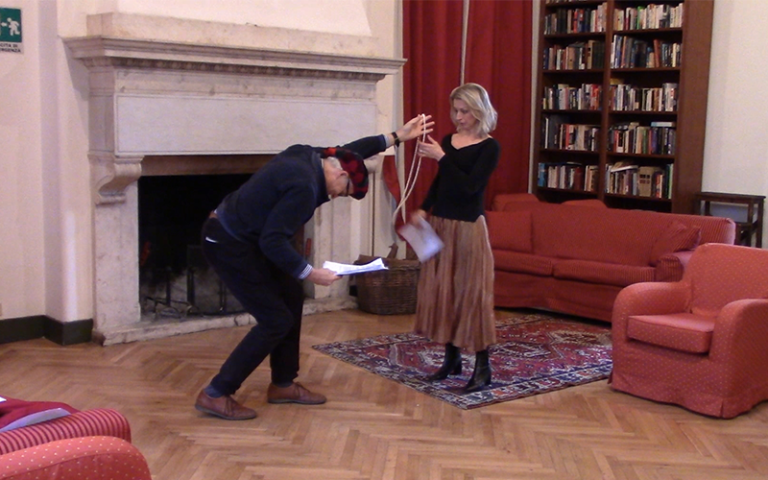Uncovering how academies in Early Modern Italy contributed to theatrical culture
Dr Lisa Sampson (UCL School of European Languages, Culture and Society) undertook a fellowship in Rome to research the little known area of theatre in Italian academies in the late Renaissance.

28 April 2023
Many plays of different kinds have been affiliated to academies in Italy from the 1500s, but little is known about how they were performed, who they were performed by, where they were performed and who watched them. During the 16th and 17th centuries, theatre flourished in princely courts, and professional actors began to form in companies (commedia dell’arte) which became increasingly visible and popular in public piazzas as well as court theatres. Yet the question of where academy theatre sat in relation to commercial theatre and court theatre has gone largely unexplored.
In response to this, Dr Lisa Sampson embarked on a fellowship with the British School at Rome (BSR), which was the first UCL-BSR fellowship. She spent six weeks in Rome, spread over three months, to undertake this research and put on a workshop at the end.
Actors and performances in Italian academies
“There were over 800 academies documented in Italy in the 16th and 17th centuries,” Lisa explained. “Members were mostly men from all sorts of different disciplines, who would gather together for learning and pleasure. They would give lectures, discuss new works and learn about new ideas. But they would also give theatre performances based on translations or original compositions, and they would discuss drama and stagecraft.”
Finding out more about the theatrical side of academy life formed the basis of Lisa’s fellowship project. She drew on the resources, libraries and connections both at the BSR and other institutions in Rome to learn more about theatre and academies. Throughout this time, she was also working towards creating a workshop at the BSR which included a performance of theatrical works produced by academies, or by professional actor-dramatists associated with these institutions, to embed practice into the research. For this she needed to identify selected theatrical works and actors during her fellowship too.
Lisa was especially interested in the role and status of actors in academies during the course of her research. Although evidence pointed to it mostly being young men performing as amateurs – although some were of ‘semi-professional’ status – women were occasionally involved in theatre in the academies too. They were employed as musicians, singers for the interludes, and sometimes as actresses. “In this period, there were a lot of restrictions on public performances by religious and political authorities,” Lisa said. “Although women began to perform on stage publicly from the 1560s in Italy, the situation varied a lot by region, and there were times when theatres were closed entirely, also in Venice. For this reason, academies were really important as areas of keeping theatre going, and providing a semi-private space where men and sometimes women could perform and attend theatre too.”
Lisa also collaborated with director, actor and theatre specialist Eric Nicholson from NYU Florence, who helped bring the workshop to fruition together with professional actor Elia Nichols. Lisa prepared translations for extracts from Andreini’s tragedy Florinda (1606) and worked with Eric to develop the series of performance extracts for staged readings. The workshop was a hybrid event, attended by a multi-disciplinary international audience, and with attendees in person from the British School and from across Rome too.
Furthering knowledge about theatre in Early Modern Italy
As part of the workshop, Lisa contributed an academic paper and co-ordinated the roundtable featuring speakers from various disciplines. Her work resulted in a conference paper for the Renaissance Society of America as well. During the fellowship, Lisa also completed a book, Drama, Poetry and Music in Late-Renaissance Italy: The Life and Works of Leonora Bernardi, and a book chapter, ‘Performance in music and for the stage’, for the Cambridge History of Poetry in Italy 1200-1600.
“The fellowship was immensely useful,” Lisa said. “Being in Rome and in the British School was incredible for the connections I could make. As a multidisciplinary humanities-based centre – which is perhaps the closest thing there is to academies nowadays – this was great for hosting practice-based theatre research. I could collaborate with people with various areas of expertise. And the artists in residence at the British School were particularly valuable in addition to the Director, Abigail Brundin, and staff.”
Lisa believes the research connections she has made through this fellowship will continue through her other work too. In her role as Co-Director at the UCL Centre for Early Modern Exchanges, Lisa also hopes to collaborate more frequently with her contacts in Rome. She said: “My immersion within this scholarly community in Italy, and the granting of funding to put together a workshop testing new aspects of my research, has been an enormous boost to completing REF publications, to building towards my current monograph project on Theatre in the Academies of Early Modern Italy, and future initiatives also including colleagues based in Italian universities.”
Recordings from the workshop
Full recital:
Individual scenes:
- Accademia degli’ Intronati, Gl’Ingannati (The Deceived), Act 1, Scene 3
- Isabella Andreini, Fragmenti (Lovers’ Debates for the Stage) no.17
- Isabella Andreini, Fragmenti (Lovers’ Debates for the Stage) no.29
- Giovan Battista Andreini, La Florinda, tragedia (Florinda, A tragedy), Act 4, Scene 6
- Shakespeare, Macbeth, Act 5, Scene 1
Image
Professor Eric Nicholson (NYU and Syracuse, Florence) and Elia Nichols perform Isabella Andreini's Lovers' Debates, British School at Rome.
 Close
Close

